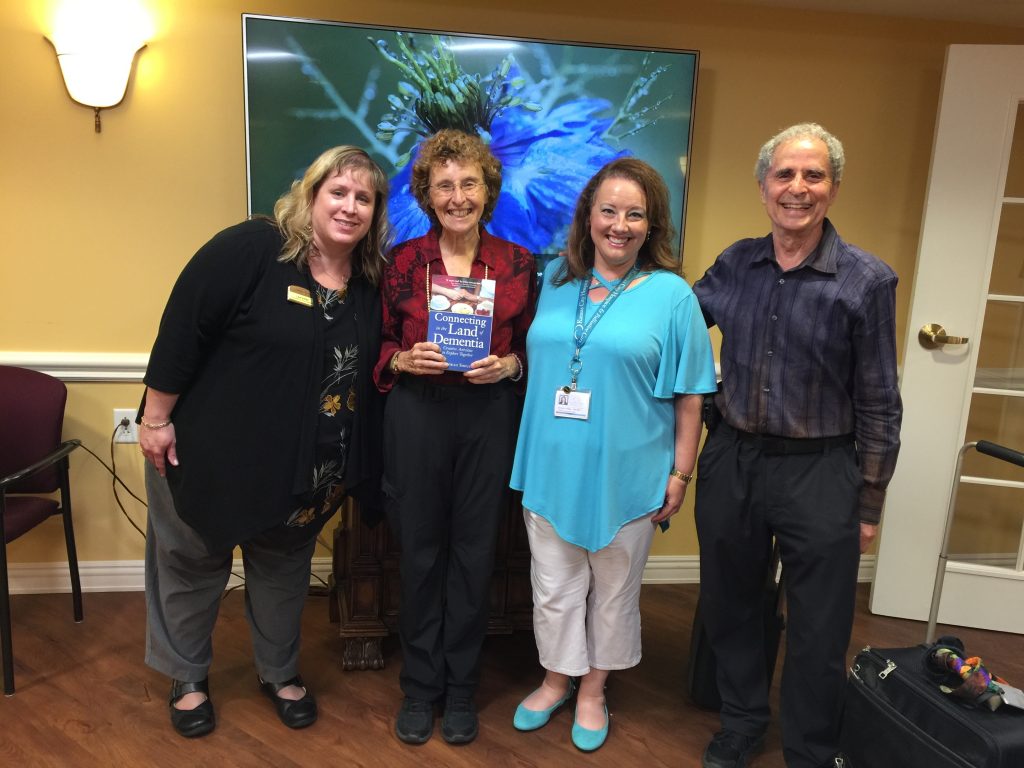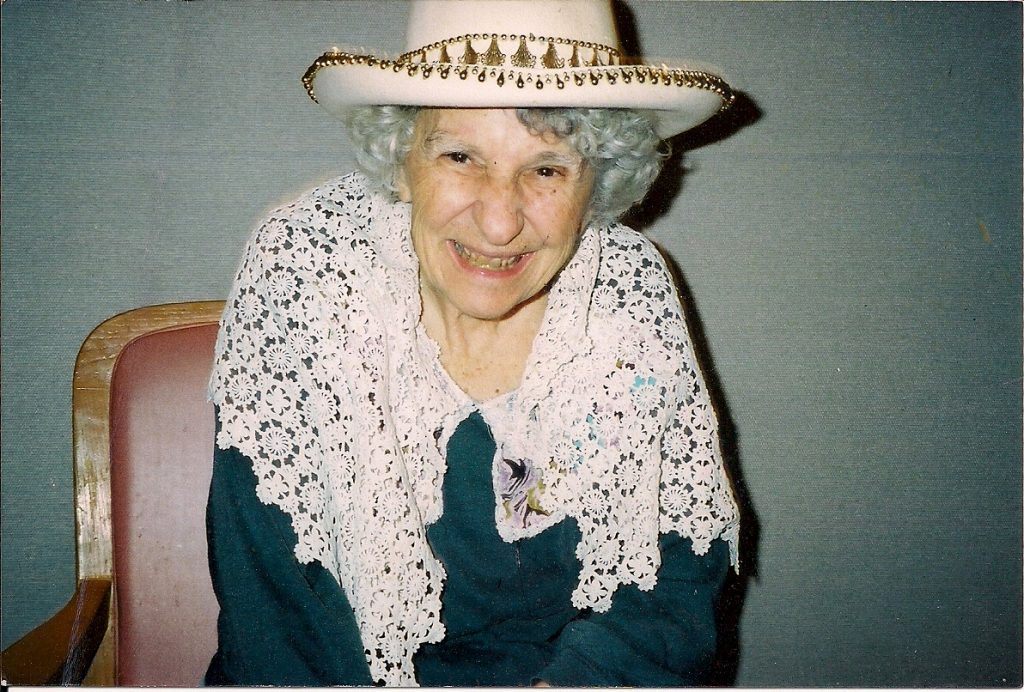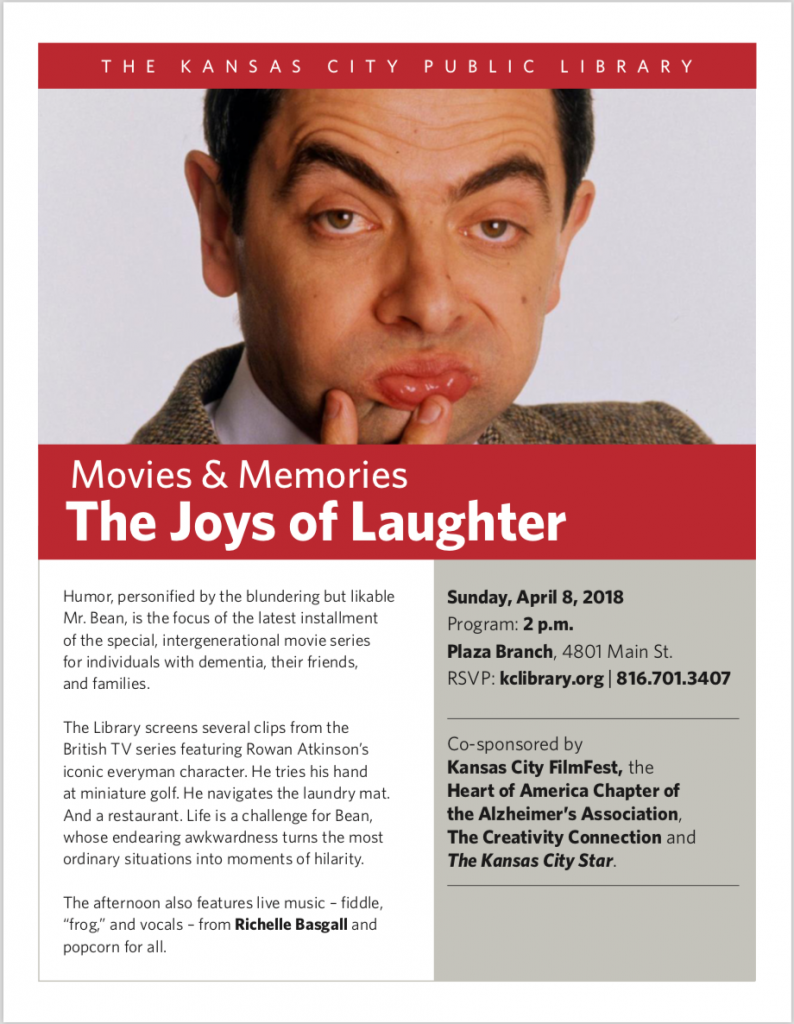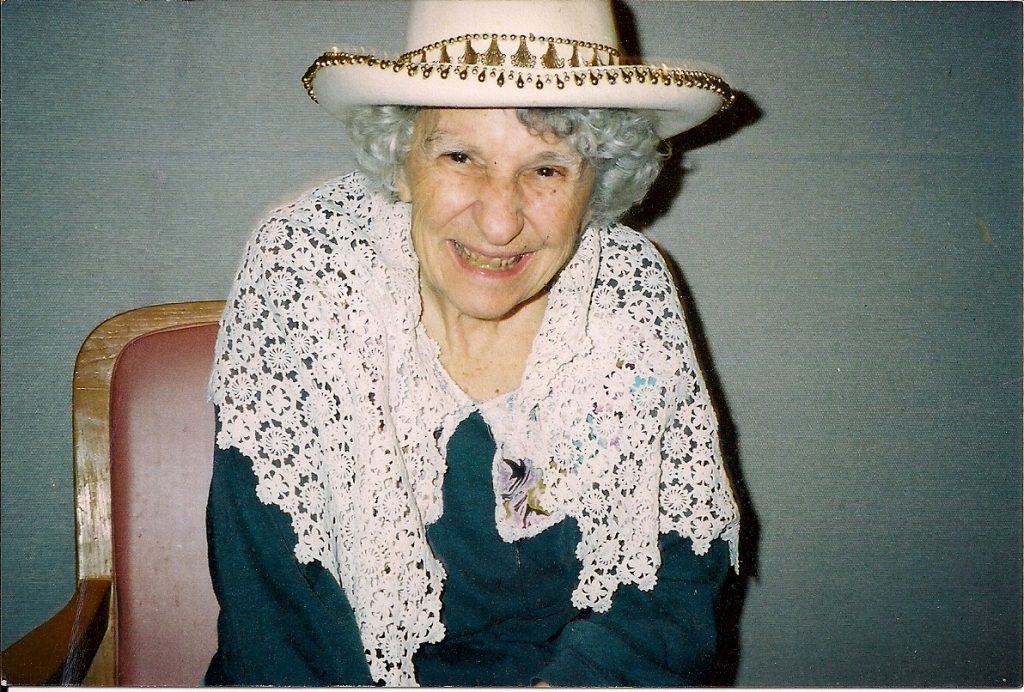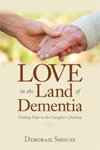Relationships
Eight Steps to Help People Living with Dementia Feel at Ease during Holiday Gatherings
As we move into the holiday season, Ron and I think often of our parents who went through their last holidays with dementia: my mom Frances and his father Frank. We wanted to share the season with them in ways that felt safe, comfortable, and honoring so we gradually developed these tips. Recently, we shared the tips via email and had such a great response we also want to share them with you.
Several people wrote, “These ideas are good for anyone, not just those with memory loss.”
What great wisdom–to treat each person with the tenderness and consideration that we often reserve for someone going through a physical or emotional illness.
We’d like to share our tips and we’d like to learn from you: what other suggestions do you have for helping people feel connected at gatherings?
Eight Steps to Help People Living with Dementia Feel at Ease during Holiday Gatherings
- When you’re in a group, help the person living with dementia feel safe and comfortable by having a trusted friend or family member stay beside him or her, explaining the proceedings and fielding questions from others, as needed.
- Encourage people to say their name and maintain eye contact when conversing with the person who is living with dementia.
- Make sure the person can come and go from the group as needed. Create a quiet space where he or she can rest — or appoint a caring person to drive your loved one home when he tires of the festivities.
- Have something special for them to look at, like a family photo album or a favorite magazine.
- Choose background music that is familiar to them, music of their era played in a style they resonate with.
- Prepare a few of their favorite foods.
- When talking to them, don’t correct or contradict or try to pull them into the current reality. Simply listen carefully and let them talk.
- Appreciate them for who they are right now.
Here’s to a holiday season filled with grace, gratitude and generosity.
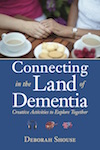
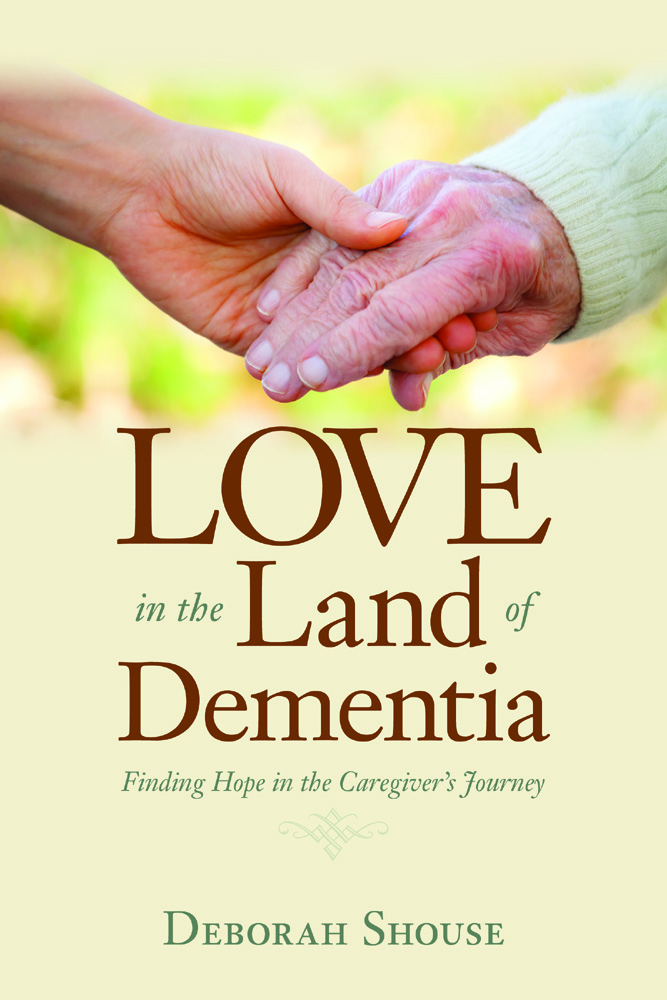
Deborah Shouse is the author of Love in the Land of Dementia: Finding Hope in the Caregiver’s Journey.
A Thanksgiving Love Story: Bringing Home the Gravy
Thanksgiving changed the year I went vegetarian. I did not mind giving up the tender, moist turkey or the savory oyster-specked stuffing. But giving up the flavorful flow of mushroom-laden gravy was quite another thing. I watched enviously as my family ladled the luscious liquids over their mashed potatoes, turkey and stuffing. As I nibbled dryly on my carrots, green beans and salad, my lower lip protruded. I felt left out and deprived.
My brother, Dan, ever alert to the pouting big sister, came up with a solution.
“Next year I will make special vegetarian gravy just for you,” Dan promised.
Years later, that special vegetarian gravy has become one of my favorite Thanksgiving rituals. I begin fantasizing about it the moment the autumn leaves turn crimson. I know that in mere weeks, my brother and his family will arrive and I will have my yearly boost of family and feasting, highlighted by gravy.
When my brother calls to tell me his travel plans, I write his arrival time and GRAVY on my calendar. The night he comes to town, we make the shopping list together, avidly discussing how many pounds of mushrooms we need for both the carnivore and vegetarian pots of gravy. I relish the early-Wednesday morning trip through the grocery store, where Dan and I and our children carefully select the foods we will be making the next day. We linger in the produce aisle, filling several sacks with gleaming white mushrooms and buying rustling yellow onions.
On Thanksgiving Day, Dan and I and other family members spend long, luxurious hours cooking. Dan mans the stove and I manage the slicing and chopping. Together we snap, peal, slice and dice the vegetables that will accessorize the turkey. I take special pleasure in wiping clean and slicing the mushrooms, then bringing my brother the brimming bowlful. When he has nodded his approval, I get out the old copper pot I bought in Germany in the early seventies. This year, Dan is improving his already amazing gravy. With his new immersion blender, he creates a rich base of caramelized onions, whose flavor surpasses that of the lowly vegetable cube. He adds in a little flour, then gentles the mushrooms into the onion broth. When the pot is bubbling with thickening nectar, he says, “Taste this and see what you think.”
I always think the same thing—“Wow, this is great.”
We are in a state of giddy and satisfied exhaustion by the time our guests arrive. We share grateful prayers with everyone and lay out the feast, including plenty of turkey-based gravy for the rest of the family.
Then comes the moment I have been waiting for: I sit down, my own personal pot of gravy poised by my plate. I cover the mashed potatoes, carrots, green beans, and salad with the aromatic concoction and I savor every bite. But more importantly, I savor the bounty, creativity, and love that have gone into this simple dish. Through this gravy, my brother speaks with his hands and his heart, saying: “I care about you and I am going to make sure you are not left out and that you have something fantastic to eat.”
For that and so much more, I am thankful.
…………
And now, if you’d like to create a Thanksgiving love story, bring home this delicious gravy.
Dan Barnett’s Chicago Style Never-Enough-Mushroom Vegetarian Gravy
Ingredients
2 large onions (chopped)
2 pounds (or more) white button mushrooms sliced (can add some portabellas for enhanced flavor)
1 cup of white wine (of lesser quality)
Salt & pepper to taste
Olive oil
Directions
To create the gravy base:
In a four -quart pot, pour a thin layer of olive oil and turn the burner on medium.
Add the onions and sauté for10-15 minutes until they are caramelized (golden brown)
Add water until the pot is about half full.
Simmer slowly for 30 minutes.
Blend the onion water mixture using either an immersion blender or by transferring the mixture to a food processor.
Once you have the gravy base
Add the 2 pounds (or more) of sliced mushrooms, white wine and fill the pot with water until it is 3/4 full.
Simmer for 30 minutes and season to taste with salt and pepper.
Deborah Shouse is the author of Connecting in the Land of Dementia: Creative Activities to Explore Together and Love in the Land of Dementia: Finding Hope in the Caregiver’s Journey.
Celebrating Great Connectors Throughout the Dementia Journey: Music, Nature, and Laughter
When care partners gather and trade stories and ideas, there’s usually magic afoot. We felt that magic when we met with a group of family and professional care partners to celebrate great connectors throughout the dementia journey. We presented engaging ideas using music, nature, laughter and more.
Lisa Vetter, Director of Healthcare Sales & Marketing, Santa Marta Senior Living Community, invited us to speak at an event announcing the community’s new care partner support group. The group is led by Jennifer Walker, RN, BSN, Clinical Community Liaison, Kansas City Hospice & Palliative Care. Jennifer also facilitates the KC Memory Cafe and she is compassionate, informed, and smart. Most importantly, she has a fantastic sense of humor.
Ron and I shared ways to stay connected through singing and music, looking at works of art together, bringing nature indoors, and laughing. And our audience shared their experiences as well.
Here’s a story about nature that inspired us.
Marcie took her mom, who was living with dementia, on a fascinating monthly outing: they drove out into the country to look at the full moon. Her mother didn’t talk much anymore, but she loved seeing the night sky and gazing at the magnificent moon. One evening, as the moonlight spread over the car, Mom began singing, When the moon comes over the mountain. Marcie had never heard the song before and her eyes filled with tears at hearing her mom sing so strongly and clearly.
Here’s a story about the power of familiar music. Karen’s mom was a devout Catholic, living with dementia. Though there were many things she didn’t remember, including her daughter’s name, when she attended Sunday mass, she melodically sang every word of every hymn.
We loved sharing with this group of dedicated and compassionate care partners, who were all seeking ways to stay connected.
Here’s an extra tip from Connecting in the Land of Dementia: When you want to boost energy and lift spirits, add a splash of laughter into your life. Look at a clock and say, “We’re going to laugh for 30 seconds,” and start ha ha ha-ing. Or pretend you’re talking on the phone and hearing a hilarious joke. Or warble out the Ha Ha Chorus by singing the Happy Birthday song in “ha ha ha” syllables.


Celebrating our Mothers
If my mother were still alive, I would be taking her roses and chocolate this Mother’s Day. She would be delighted and her delight would magnify when my daughters and her great-grandchildren arrived. Love is such a beautiful glue, such a simple and strong way to stay connected. I wanted to share this story from Love in the Land of Dementia, as a way of celebrating our mothers.
The Woman She Was
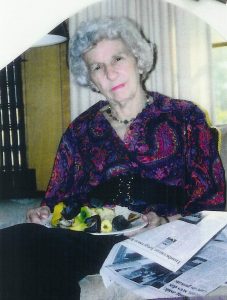 My friend Karen gives me a gift: she says, “Tell me about your mother.”
My friend Karen gives me a gift: she says, “Tell me about your mother.”
We are sitting in a quiet mid-afternoon café and I let the question sink into me.
When friends occasionally ask me, “How is your mother doing?” I have different answers, depending on the situation. If we are in one of those conversations that are like confetti in brisk wind, I say, “She’s okay.”
If we are sitting across from each other and my friend is looking right at me, I answer, “She’s pretty deep into Alzheimer’s.”
“Does she recognize you?” she might ask.
“No, but she may recognize I am a person she likes,” I answer.
That usually ends that conversation.
But “Tell me about your mother,” is an invitation I don’t usually get.
“What would you like to know?” I ask.
She stirs her iced mocha. “Whatever you want to tell me,” she says softly. “I would like to know about her life and her interests.”
Since my mother has been in the nursing home with Alzheimer’s, I have seldom talked about the person she used to be. Occasionally my father and I reminisce about family vacations and outings. I sometimes ask Dad questions about our growing up days and the early days of their courtship. But I rarely think about the woman I knew all my life, the mother, grandmother, artist, gardener, compassionate friend, avid reader, bird-watcher, early morning walker, lemon-meringue pie baker. That woman is gone and I have spent a lot of energy learning to know and appreciate the woman who now commandeers her body.
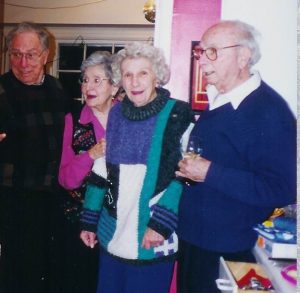 As I consider what I want to tell Karen, I remember visiting my mom’s best friend, Bel, in California when I was a teenager. Bel, who was spunky and adventurous in a way that seemed so different from my conservative mother, drove me from Berkeley to the small resort where I would work as a chambermaid for the summer.
As I consider what I want to tell Karen, I remember visiting my mom’s best friend, Bel, in California when I was a teenager. Bel, who was spunky and adventurous in a way that seemed so different from my conservative mother, drove me from Berkeley to the small resort where I would work as a chambermaid for the summer.
“Do you know how I met your mom?” she asked me, as we drove down the winding roads, past fragrant stands of eucalyptus trees.
“In Iceland, during the World War II,” I said. I had heard stories of the two of them taking a break from their work in the hospital by skiing, then stopping for a soak in a hot springs.
“No, we met earlier in Chicago. We were both nurses working the twelve-hour night shift. The hospital had a room with a couple of bunk beds so we could rest on breaks. One night I walked in there and heard the most heart-breaking sobbing. It was Frances, crying her eyes out. I asked her what was wrong and she said, ‘Nothing.’”
I smiled. That sounded like Mom, never wanting to admit anything was wrong.
“Then I asked her again and she sobbed out that her husband Sam had died six months ago from pneumonia. She was so sad she didn’t know if she could go on. A bunch of other nurses and I were going to Florida for a short vacation and I persuaded your mother to join us. But as it turned out, we never went; a week later I decided to join the Army and I encouraged her to come along. We’ve been best friends ever since.”
When I heard this story at the age of seventeen, I was too young to fathom my mother’s grief and despair. By the time I told Karen the story, I had some sense of what my mother must have gone through.
“Your Mom was really brave, to serve in the Army during wartime,” Karen says.
I feel a little swell of pride. Mom’s tales of traveling in the darkest night on the troop ship, with bombs falling nearby, were so familiar I had never considered her bravery and courage.
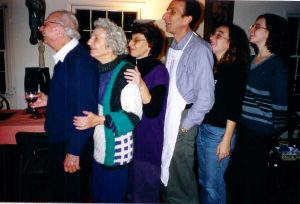 Now I tell Karen how my father, encouraged by Bel’s husband, wrote Mom a letter, telling her he was ready to marry a nice Jewish girl. Was she interested? Was she available?
Now I tell Karen how my father, encouraged by Bel’s husband, wrote Mom a letter, telling her he was ready to marry a nice Jewish girl. Was she interested? Was she available?
After some correspondence, Mom surprised herself by agreeing to meet him in Chicago. At the end of the week, my father asked her to marry him. She considered the offer for three weeks and accepted. Their whirlwind romance was fueled by practicality.
“What a great story,” Karen says. “Your mother must be an amazing woman.”
Sparked by Karen’s interest, I let myself feel my love for my mother as she used to be. I am in tears by the time our conversation ends.
“Thank you for asking me about my mother,” I say to Karen.
“Your stories make me want to call my own mom and hear her stories again.”
As I drive home, I think of more “mom” stories to share with my children and my brother. I see myself, along with my brother and father, as the carrier of my mother’s sacred legacy. I imagine myself tenderly fanning the embers, adding dry leaves and crumbled paper, creating a blaze with each memory. I realize I don’t have to give up Mom’s old self: I can be her historian and her scribe, carrying her stories with me, and making sure they live on.


Movies and Memories: Laughter Triumphs Over Weather
It’s a Sunday morning in early April and we were excited about our Movies and Memories laughter program that afternoon at 2:00.
Then, the unthinkable happened. It started to snow, blanketing the daffodils and tulips with just enough flakes to make people want to cozy up at home.
What did we do? Laugh, of course.
Laughter was the theme of our April program and we had excerpts from the inestimable Mr. Bean to anchor our program.
As Emily from the Kansas City Public Library, Plaza Branch, made our popcorn and other library staff readied the technology, we accepted the fact that we might have only our intrepid volunteers in the audience. We all vowed to have a great time anyway.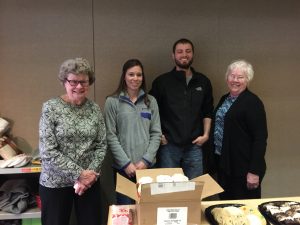
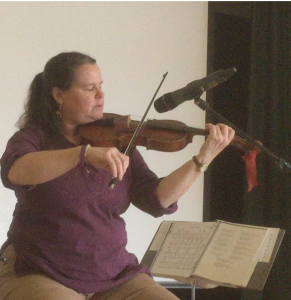 Musician Richelle Basgall regaled us with songs and stories and our guests began to arrive. Soon we had about 30 people who ignored the weather and were ready for fun. And fun we had. One of our volunteers brought us sumptuous cookies and small cakes. The aroma of fresh popcorn warmed us all and we laughed our way through a hilarious clip of Mr. Bean playing miniature golf. Then we passed out jokes, which we laughingly shared with each other. (What kind of sandwiches do astronauts eat: Launch meat! Why did the oil painting get sent to jail? It was framed!)
Musician Richelle Basgall regaled us with songs and stories and our guests began to arrive. Soon we had about 30 people who ignored the weather and were ready for fun. And fun we had. One of our volunteers brought us sumptuous cookies and small cakes. The aroma of fresh popcorn warmed us all and we laughed our way through a hilarious clip of Mr. Bean playing miniature golf. Then we passed out jokes, which we laughingly shared with each other. (What kind of sandwiches do astronauts eat: Launch meat! Why did the oil painting get sent to jail? It was framed!)
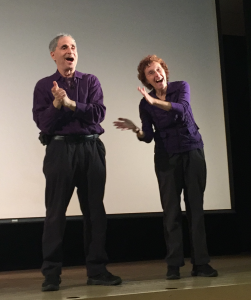 After watching Mr. Bean’s laundromat escapades, we had a laughter yoga session. We didn’t have to worry about traditional physical yoga postures—laughter yoga includes clapping, gestures, playfulness, and breathing. Everyone was a hearty laugher and we were all relaxed and smiling as we watched Mr. Bean’s horror as he tried to cope with raw oysters at a fancy restaurant.
After watching Mr. Bean’s laundromat escapades, we had a laughter yoga session. We didn’t have to worry about traditional physical yoga postures—laughter yoga includes clapping, gestures, playfulness, and breathing. Everyone was a hearty laugher and we were all relaxed and smiling as we watched Mr. Bean’s horror as he tried to cope with raw oysters at a fancy restaurant.
Our ending surprise was a delicious way to take Mr. Bean home— gourmet jelly beans!!
Click here for a short video experience.
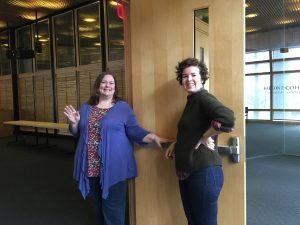 Stay tuned for our next Movies and Memories event in August!
Stay tuned for our next Movies and Memories event in August!
Want to have a movies and memories event right in your own home?
Here are a few tips:
If you’d like to make this an intergenerational experience, select a movie or clips you all might enjoy.
Choose a time of day when the person living with dementia will have good energy.
Get your favorite movie treats ready.
Create times to pause and chat about what you’ve seen.
Print out simple jokes as a great way to spread the laughter.
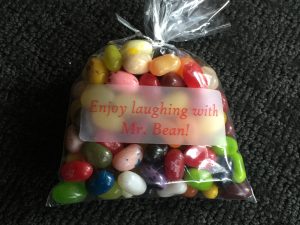 If you wish, offer a surprise at the end, either something that reminds you to laugh or smile. And if you like sweets, our jelly beans were a huge hit! With all those flavors, you have a lot to talk about!
If you wish, offer a surprise at the end, either something that reminds you to laugh or smile. And if you like sweets, our jelly beans were a huge hit! With all those flavors, you have a lot to talk about!


My Mom’s New Holiday Tradition: Smiling
**
We roll into the memory care facility’s dining room just as the show is ready to start. The singer, Thelda, kicks off her shoes and presses play on the boom box. Above the cheerful sound track, she sings Jingle Bells. She dances across the room with the remnants of ballroom steps. She stops in front of Mom and sings right to her. She gets on her knees, so she can look into Mom’s eyes, and keeps singing. Mom notices her and smiles a little.
Thelda moves on, singing to each of the patients gathered around, so intent on making a connection that she often forgets the words.
“Is it all right for your Mom to come to Christmas holiday events?” the activity director had asked me, when Mom moved in.
“Yes, I’d like her to go to any activities. She likes the extra energy.”
I think Mom would approve of my decision, even though she has never celebrated Christmas. Growing up, her immigrant mother held on to the Jewish spirit of her home, kneading dough for Friday evening challah, observing each holiday and prayer period in her own way. Some orthodox women followed the religious law that commanded a small piece of the dough be burned as an offering to God. My grandmother was poor; she did not believe in burning good food, regardless of tradition. So she sacrificed a portion of the dough to her youngest daughter, my mother Fran. She created a “bread tail,” leftover dough that she baked, then smeared with butter and sprinkled with sugar . When Mom used to talk about her mother, she always mentioned this special treat.
Even when I was growing up, and we were the only Jewish family in our neighborhood, my mother still did not sing Christmas song. She let the holiday rush by her, like a large train, whooshing past and leaving her behind.
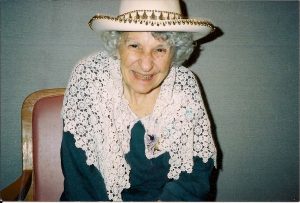 Now, I am singing Christmas carols to my Mom for the first time and she is smiling. She has moved beyond the place where the religions are different, beyond the place where she wants to separate the dough and make a sacrifice for tradition. Her new tradition is anyone who can make her smile.
Now, I am singing Christmas carols to my Mom for the first time and she is smiling. She has moved beyond the place where the religions are different, beyond the place where she wants to separate the dough and make a sacrifice for tradition. Her new tradition is anyone who can make her smile.
With each song, from White Christmas, to Silver Bells, to Frosty the Snowman, Thelda moves back to Mom, tapping her, acting sillier and sillier. Each time, Mom lifts her head and widens her mouth for a second.
For her finale, Thelda puts on a big red nose and sings Rudolph. When she dances in front of Mom with that scarlet nose, Mom laughs, her face a miracle in pure enjoyment. I laugh too, so delighted to see Mom engaged and absorbed.
Two weeks from now, I will bring a menorah and candles into my mother’s room. My father and I will have a short Chanukah ceremony with Mom. She will pick at the shiny paper covering the Chanukah gelt (chocolate candy disguised as money). She will slump over in her chair. But she will come back to life when she sees me, her only daughter, wearing a big red nose as I light the menorah.Here’s to a meaningful and fun holiday season.
I look forward to connecting with you when I resume blogging in early January.


Six Secrets of Dementia Inclusive Holiday Cooking
I named my brother Dan, our head chef, first. Then I included the support team—myself, my mom, my daughters and nephews.
“Did I help?” Mom whispered as I passed her the mashed potatoes.
“You sure did,” I told her. ”You mashed the potatoes, put the marshmallows on the sweet potato casserole, and mixed the fruit salad.”
“That’s good,” she said. “I like to help.”
Our desire to help and contribute to seasonal celebrations doesn’t end with a diagnosis of dementia. It’s lovely to linger in the kitchen together, preparing food for the holidays. It’s even lovelier when you can adapt and enjoy dementia inclusive holiday cooking so that people of varying abilities can participate.
Rebecca Katz, author of The Healthy Mind Cookbook, sees food as a great equalizer, something anyone can enjoy regardless of abilities. Fixing a delicacy for someone offers a tangible and delicious way to give back.
Here are six secrets of iementia Inclusive holiday cooking.
- Leaf through a favorite family cookbook or recipe box and use the pictures and recipes as a catalyst for conversation. Ask open-ended questions, such as, ”What does that brownie recipe make you think of?” “What do you like about the holiday season?”
- Chose a time of day when you’re both rested.
- Create a comfortable kitchen environment, by playing familiar seasonal songs you can both hum or sing along to. Reduce extraneous noise and distractions, such as a television in the background.
- If you wish, take photos during the experience. That way, you can relive the adventure and share with family and friends.
- Indulge in instant gratification, if possible, by sampling your work when the cooking is complete.
- Even if the person living with dementia can’t help prepare food, he can still enjoy sitting in on the action and the conversation.
Whether you’re stirring a pot of orzo or dropping mint leaves into cool water, enjoy your time of creation and connection in the kitchen.
A longer version of this piece originally appeared on Joan Lunden’s excellent website: Enjoy Dementia Inclusive Holiday Cooking. Thanks to Sue Fitzsimmons, MS, ARNP, Judith Fertig, author of The Memory of Lemon, Kate Pierce, LMSW, Alzheimer’s Association Greater Michigan Chapter, and Rebecca Katz, author of The Healthy Mind Cookbook
Deborah Shouse is the author of Connecting in the Land of Dementia: Creative Activities to Explore Together and Love in the Land of Dementia: Finding Hope in the Caregiver’s Journey.
7 Tips for Reducing Caregiver Isolation
Some years ago, when my mom was diagnosed with dementia, I didn’t know anyone else who was going through this journey. I felt very alone, even though I had a beautiful network of friends. I turned to writing to help me make sense of the situation. Eventually, I gathered the courage to share my personal essays with others, often through simply reading my stories aloud to friends and family. Being able to share my thoughts and feelings on this deeply meaningful dementia experience was so therapeutic, and it inspired me to reach out to other caregivers. Through my years as a family caregiver and through interviewing dozens of caregivers and experts in the field of dementia, I gleaned these 7 tips for reducing caregiver isolation.
Listening
When my friend Karen asked me to tell her more about my mom’s life, I was thrilled. I had been so immersed in my caregiving responsibilities, I had forgotten Mom’s fascinating adventures as a nurse in WWII, her worldwide travels, and more. Simply asking questions about the person who is living with dementia and listening avidly to the stories is a gift to the caregiver.
Visiting
“Your mother is so interesting,” my friend Jane said. Jane had offered to simply come to my house and have a short visit with me and Mom. My mother was going through a period of repetition and I had heard her tale of the natural hot springs in Iceland at least 113 times. But watching Jane lean forward, ask cogent questions, and smile at Mom allowed me to appreciate Mom’s stories in a new way. These were cornerstones in my mother’s life and Jane’s interest reminded me what treasures they were.
Enriching
Mom had been a vibrant movie-goer, an avid opera lover, and an ardent museum enthusiast. But when she could no longer go out, I loved it when people offered to bring arts, culture, and the occasional dog, to us. Studies show that even indirect contact with animals reduces stress. Visits from small dogs and cuddly babies boosted both our spirits and helped us feel connected with our community.
Bringing over an art book and gazing at favorite painters together invited out the creative spirit and were a catalyst for open-ended conversation. Singing and playing music with others stirred up positive memories and filled us with happiness and well-being.
Exercising
So often, caregivers forget the power of fresh air and exercise. They forget the joy of sunshine and trees. When they don’t have the steam to set out on their own, offering to take them on a stroll, a run, to a yoga class, or just to sit on a bench in a park, can offer moments of connection and renewal.
Noticing
“What can I do for you?” my life-partner often asked. Frequently, I was so overwhelmed I had no answer. So he asked me concrete questions. “Do you need any errands run?” “Would you like me to make dinner?” “Are there phone calls I can help you make? Grocery shopping I can do?” Offering to do simple tasks helped me understand I did not have to soldier through this alone. Help was all around me and one of my spiritual journeys was learning how to receive it.
Inviting
It’s not always easy to stay connected with friends who are living with dementia and their caregivers, but it is so worth it. Even when my mother felt lost at social gatherings, she still enjoyed the energy of being around empathetic friends. Even when she didn’t understand every speck of conversation, she relished being around others and meeting new people. So did my father and so did I. Having friends reach out with invitations reminded us we were still part of our community.
Asking
Sometimes we don’t know what to say to our friends who are caregivers for those living with dementia. We don’t know what to do. Then it’s time to simply state the truth and tell them, “I want to be there for you, to understand what you’re going through. I want to support you, and I don’t quite know how to do it. Can you guide me?”
Chances are the answer will be a warm hug and a resounding, “Yes.”


A Thanksgiving Love Story: Bringing Home the Gravy
Thanksgiving changed the year I went vegetarian. I did not mind giving up the tender, moist turkey or the savory oyster-specked stuffing. But giving up the flavorful flow of mushroom-laden gravy was quite another thing. I watched enviously as my family ladled the luscious liquids over their mashed potatoes, turkey and stuffing. As I nibbled dryly on my carrots, green beans and salad, my lower lip protruded. I felt left out and deprived.
My brother, Dan, ever alert to the pouting big sister, came up with a solution.
“Next year I will make special vegetarian gravy just for you,” Dan promised.
Years later, that special vegetarian gravy has become one of my favorite Thanksgiving rituals. I begin fantasizing about it the moment the autumn leaves turn crimson. I know that in mere weeks, my brother and his family will arrive and I will have my yearly boost of family and feasting,
When my brother calls to tell me his travel plans, I write his arrival time and GRAVY on my calendar. The night he comes to town, we make the shopping list together, avidly discussing how many pounds of mushrooms we need for both the carnivore and vegetarian pots of gravy. I relish the early-Wednesday morning trip through the grocery store, where Dan and I and our children carefully select the foods we will be making the next day. We linger in the produce aisle, filling several sacks with gleaming white mushrooms and buying rustling yellow onions.
On Thanksgiving Day, Dan and I and other family members spend long, luxurious hours cooking. Dan mans the stove and I manage the slicing and chopping. Together we snap, peal, slice and dice the vegetables that will accessorize the turkey. I take special pleasure in wiping clean and slicing the mushrooms, then bringing my brother the brimming bowlful. When he has nodded his approval, I get out the old copper pot I bought in Germany in the early seventies. This year, Dan is improving his already amazing gravy. With his new immersion blender, he creates a rich base of caramelized onions, whose flavor surpasses that of the lowly vegetable cube. He adds in a little flour, then gentles the mushrooms into the onion broth. When the pot is bubbling with thickening nectar, he says, “Taste this and see what you think.”
I always think the same thing—“Wow, this is great.”
We are in a state of giddy and satisfied exhaustion by the time our guests arrive. We share grateful prayers with everyone and lay out the feast, including plenty of turkey-based gravy for the rest of the family.
Then comes the moment I have been waiting for: I sit down, my own personal pot of gravy poised by my plate. I cover the mashed potatoes, carrots, green beans, and salad with the aromatic concoction and I savor every bite. But more importantly, I savor the bounty, creativity, and love that have gone into this simple dish. Through this gravy, my brother speaks with his hands and his heart, saying: “I care about you and I am going to make sure you are not left out and that you have something fantastic to eat.”
For that and so much more, I am thankful.
…………
And now, if you’d like to create a Thanksgiving love story, bring home this delicious gravy.
Dan Barnett’s Chicago Style Never-Enough-Mushroom Vegetarian Gravy
Ingredients
2 large onions (chopped)
2 pounds (or more) white button mushrooms sliced (can add some portabellas for enhanced flavor)
1 cup of white wine (of lesser quality)
Salt & pepper to taste
Olive oil
Directions
To create the gravy base:
In a four -quart pot, pour a thin layer of olive oil and turn the burner on medium.
Add the onions and sauté for10-15 minutes until they are caramelized (golden brown)
Add water until the pot is about half full.
Simmer slowly for 30 minutes.
Blend the onion water mixture using either an immersion blender or by transferring the mixture to a food processor.
Once you have the gravy base
Add the 2 pounds (or more) of sliced mushrooms, white wine and fill the pot with water until it is 3/4 full.
Simmer for 30 minutes and season to taste with salt and pepper.
Deborah Shouse is the author of Connecting in the Land of Dementia: Creative Activities to Explore Together and Love in the Land of Dementia: Finding Hope in the Caregiver’s Journey.
Let’s Go to the Movies: A Dementia-Friendly Series
“Let’s go to the movies,” my dad often said to my mom. My parents would have loved our Movies and Memories series, now starting its second year. We are excited to announce our partnership with the Kansas City Boys Choir and the Kansas City Girls Choir this season. Some of their outstanding performers will be joining us at each event.
Already, the series is making a difference in a variety of ways. Additional libraries in Missouri and other states are interested in implementing the program. And our library is so committed to becoming more dementia-friendly that it is having special training for its staff, courtesy of the Alzheimer’s Association — Heart of America Chapter. Please share this invitation with those who would enjoy it. And if you’re in the Kansas City area, please join us. It’s free and open to all. Let’s go to this movie series!

